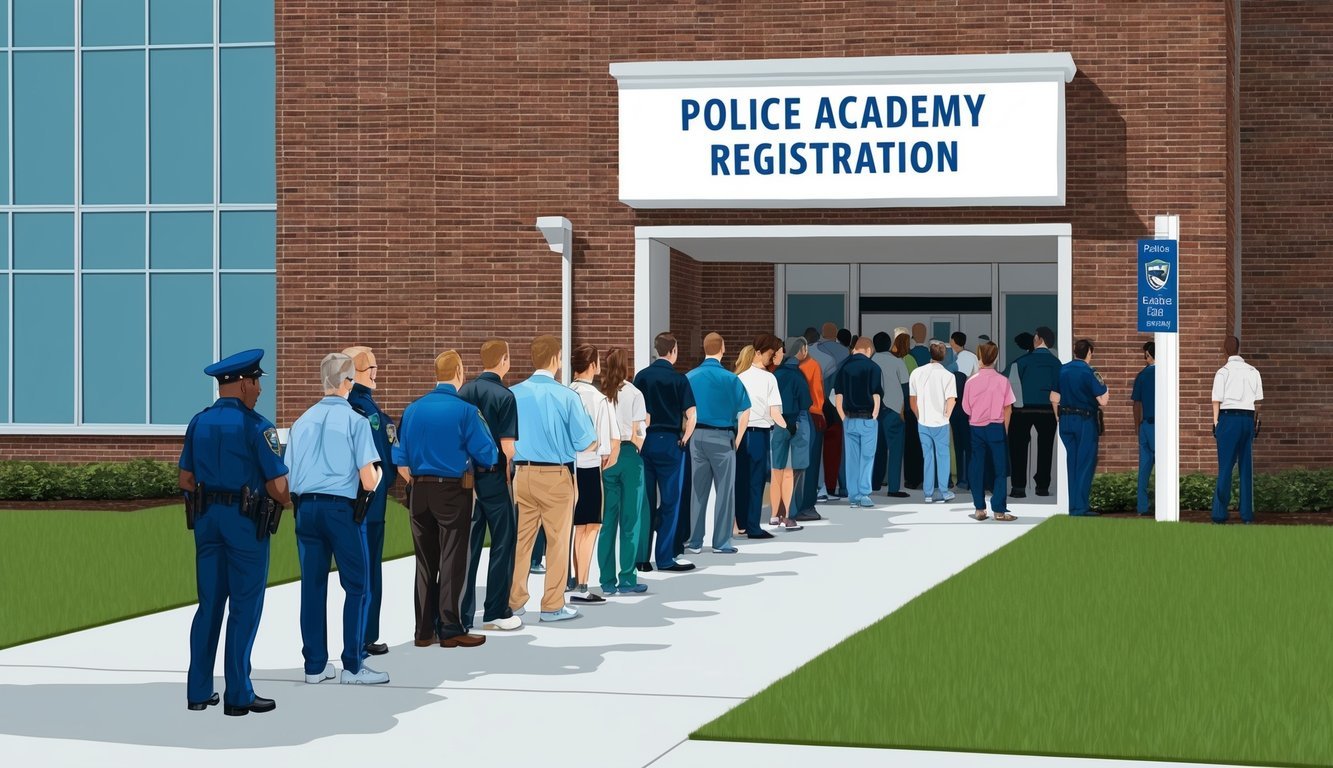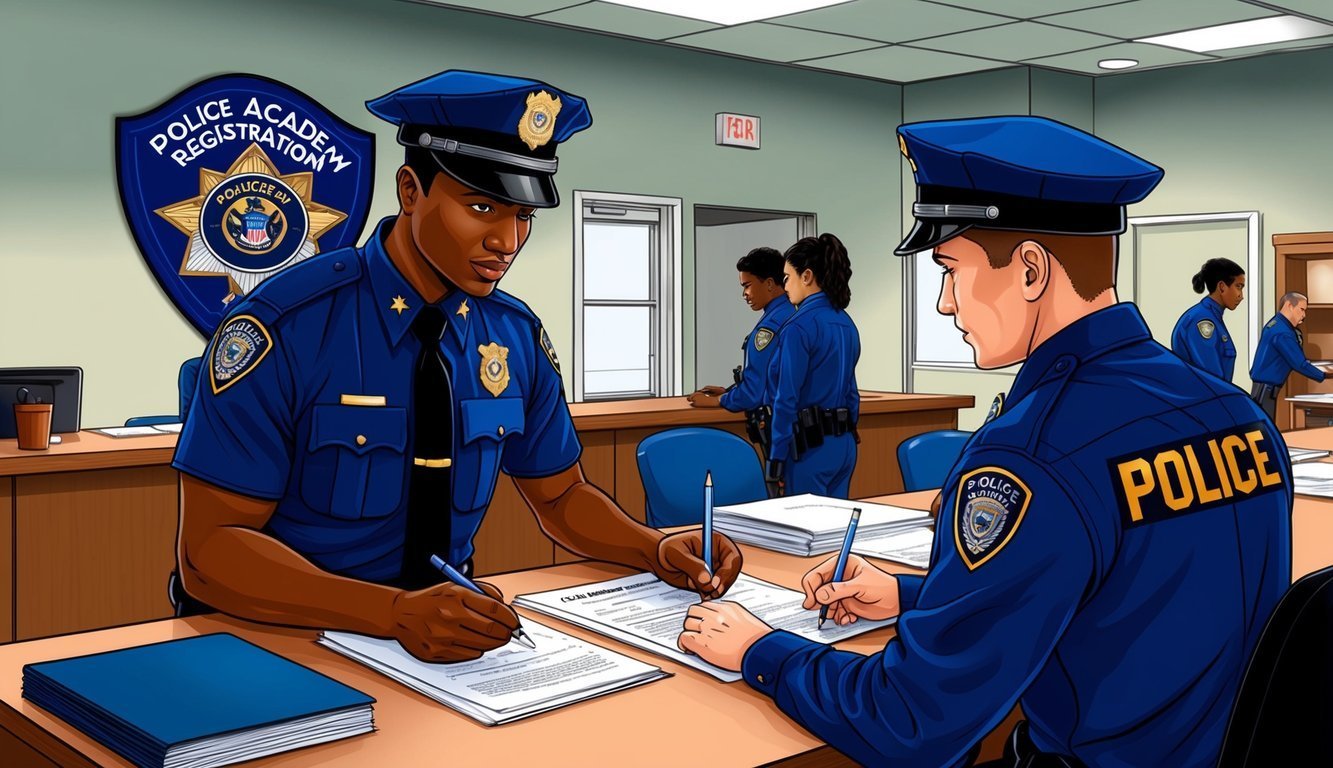“`xml
Thinking About Joining the Police Force?
Thinking of becoming a cop? Your journey kicks off by signing up for the police academy—a fantastic first step toward a fulfilling career in law enforcement.
Trust me, it’s worth considering!
Before you jump in, there are a few hoops to jump through.
You’ll need to meet some age, education, and physical fitness standards.
After that, completing an application and passing thorough background checks is next on the list.
It might sound a bit intimidating, but don’t worry—preparation is key!
For those under 21, many police departments offer cadet programs.
These programs let you get a taste of police work while you wait to meet the age requirements for the academy.
It’s a fantastic way to get a leg up!
Getting ready for the academy is no small feat.
You’ll want to stay physically fit and brush up on your written tests.
Some academies, like the one in Baltimore County, run for a tough 27 weeks.
But trust me, the rewards, from decent pay to great benefits for fresh officers, make it all worthwhile.
Key Takeaways
- Applicants must meet specific requirements and pass checks to enter the academy.
- Being physically fit and academically prepared is crucial for success in training.
- Many departments offer competitive salaries and benefits for new police officers.
Navigating the Application Process
Getting into the police academy takes some effort, but you can handle it! Here’s a quick game plan.
First, check your eligibility.
You’ll want to nail age, education, and pass a background check.
Then, if you’re new to civil service exams, here’s a guide to help you get started.
Finally, gather your documents—like ID and proof of residency—before you hit ‘submit’ on your application.
Eligibility and Prerequisites
To enroll in the police academy, you need to tick a few boxes.
Most places want you to be at least 18 years old and have a high school diploma or a GED.
And, of course, integrity is a must! Having a clean record—no serious felonies—is vital.
Remember, a thorough background check will happen, so it’s better to be upfront.
Minor offenses might fly under the radar, but it all depends on the department’s policies.
Oh, and being in good shape? That’s crucial too.
Most academies include physical fitness tests, so if you can run a bit and do some push-ups, you’ll be in a better spot.
Gathering Required Documentation
When it’s time to apply, you’ll need an application packet filled out and ready to go.
It’s generally packed with questions about your personal info.
Here’s a quick list of what you might need to provide:
- Birth certificate
- Social security card
- Driver’s license
- High school diploma or GED certificate
- College transcripts (if you’ve got ‘em)
- Military records (for those who’ve served)
You might also have to take a few tests, like:
- Written exams to assess your reading and writing skills
- Physical fitness tests
- Drug screenings
- Medical exams
Pro tip: Start gathering these documents now! That way, you’ll be all set when it’s time to apply.
Understanding the Costs
Now, let’s talk money.
Joining the police academy isn’t exactly a free ride.
Costs can vary widely depending on where you live.
Some departments might cover your training costs if they hire you first, while others may have you pay out of pocket.
If you’re footing the bill, here’s what to keep in mind:
- Tuition fees
- Books and supplies
- Uniforms
- Equipment like a gun belt or flashlight
Some academies offer financial aid or payment plans, so don’t hesitate to ask about costs upfront.
Planning ahead can save you a headache later!
Preparation for the Academy
Getting ready for the police academy is all about commitment and hard work.
You’re building strength, sharpening your mind, and embracing the very essence of police work.
Physical Fitness and Training
Let’s be honest—police work can be physically demanding.
You need to be in top shape right from day one.
Most academies will have fitness tests designed to assess your endurance with running, push-ups, and sit-ups.
Start a workout routine months in advance.
Focus on:
- Cardio: Run three to five times a week.
- Strength: Lift weights two to three times a week.
- Flexibility: Stretch daily.
Don’t forget about obstacle courses—they’re a big part of training, so practice climbing, jumping, and crawling, too!
Eating healthy is essential.
Cut out the junk food and stay hydrated.
Good nutrition helps your body and mind perform at their best.
Academic and Skill Development
Police work isn’t all about brawn; it requires some brainwork too! Brush up on these key areas:
- Criminal law
- Report writing
- First aid
- Ethics
Get a head start by reading police manuals or signing up for online courses.
Practicing clear and concise report writing is vital for any cop.
Plus, understanding investigative procedures and traffic laws will prepare you for the tests ahead.
And think about taking a CPR class—first aid knowledge could save someone’s life on the job.
Embracing the Ethos
Being a police officer is more than just a job; it’s a calling! Start thinking like an officer now.
Dive into police culture and values.
Read books by cops, or check out some documentaries about law enforcement.
Practice setting a routine for yourself to get used to the structure of the academy.
Communication is key, too! Police interact with all sorts of people, so work on being clear and respectful.
Get mentally tough, because the academy won’t be a walk in the park.
But keep your chin up and remember why you want to serve.
Frequently Asked Questions

Thinking about joining the police academy raises a lot of questions—don’t worry, you’re not alone! Here are some common queries about the application process and what to expect.
What documents do I need to apply for a police academy?
When applying to a police academy, you’ll typically need several documents.
Commonly required items include:
- Valid driver’s license
- High school diploma or GED
- Birth certificate
- Social Security card
- Military discharge papers (if applicable)
Always double-check with the specific academy for their documentation requirements.
What are the physical fitness standards for police academy applicants?
Know this: physical fitness standards are no joke.
Most police academies will demand tests like:
- Timed running tests
- Push-ups and sit-ups
- Obstacle courses
These requirements can vary, so take a look at each academy’s specific guidelines to get a heads-up.
Can someone outside of Illinois attend a police academy in Illinois?
It’s a mixed bag.
Some academies in Illinois might allow out-of-state applicants, while others may have stricter policies.
It’s best to check with the specific academy you’re interested in.
Typically, academies prioritize in-state residents, and out-of-state applicants may have additional requirements or fees.
What are the typical disqualifiers during the police officer selection process?
Common disqualifiers can really throw a wrench in your plans, like:
- Felony convictions
- Recent drug use
- Poor driving record
- Failed background check
Specific disqualifiers can vary depending on the department, so honesty on your application is essential.
How frequently are police academy exams conducted?
Exams don’t happen all the time—it really depends on where you are! Some departments might hold exams annually, while others could do them multiple times a year.
Big cities might have frequently scheduled exams, while smaller towns may offer them less often.
It’s always smart to check with your local departments for specific schedules.
What’s the duration of the training period at the police academy?
Generally, police academy training spans between 13 to 19 weeks.
Some programs might take longer, stretching up to six months, depending on the state and academy.
Expect to cover everything from physical fitness to legal education and hands-on skills during that time!
“`

